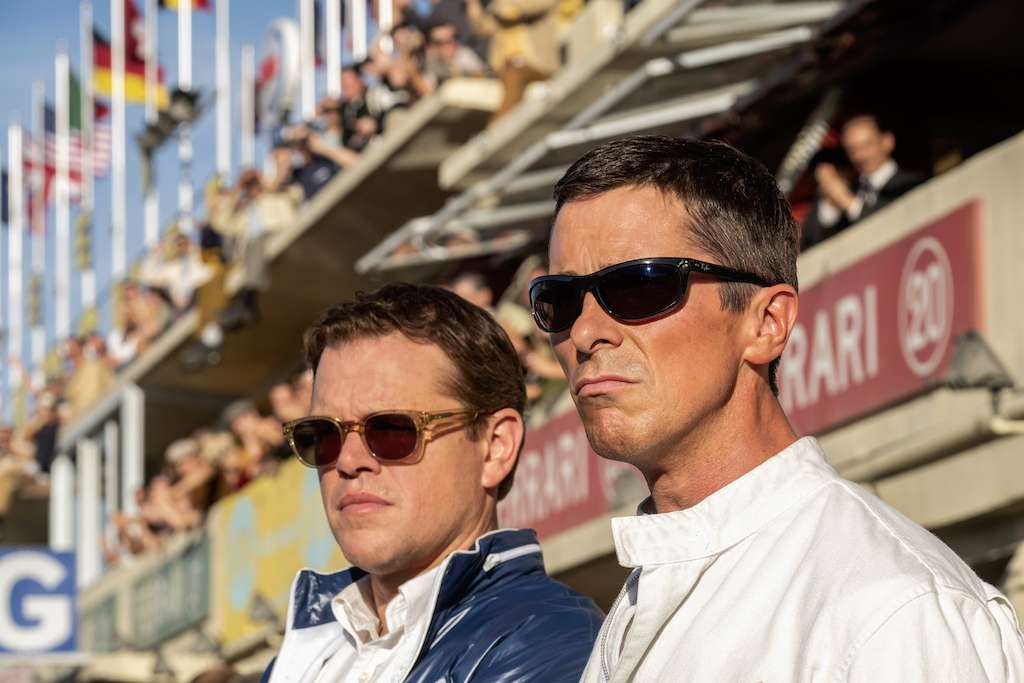
It’s a testimony, I suppose, to how far films have come in recent years that James Mangold’s Ford v Ferrari feels so retro. There was a time, not too long ago, that many American films looked like this: celebrations of fatherhood, male bonding, fast cars, and American gumption, made up of casts that were 98 percent male and 100 percent white. And, of course, that’s perfectly appropriate for this film, which is set in the world of car manufacturing and car racing in the mid 1960s. Not a lot of female or black executives at the old Ford Motor Company back then. But still…I was sort of thinking we had put these sorts of stories on the back burner, at least for a while, now that we’ve finally realized that there are so many other stories to tell. Guess not.
(I’m preemptively responding to an anticipated reaction to my review: Why didn’t you register this same complaint about Marty’s The Irishman, which also featured a predominantly white, predominantly male cast and you raved about? Because Scorsese’s film wasn’t celebratory or flag-waving. It was a serious, rigorous examination of male fragility and ego and an uncompromising work of art. Those will always be allowed.)
But let’s put aside my objection to Ford v Ferrari’s unapologetic squareness. There’s still lots to enjoy about the film, which provides us with two wonderful lead performances, exciting speed races, and car executives wearing some of the most beautifully tailored suits this side of Mad Men. (Come to mama, Lee Iacocca.)
Matt Damon plays Carroll Shelby, a celebrated race car driver who, thanks to a bum ticker, has to give up what he loves. He busies himself building and selling high-end sports cars, until he’s approached by two Ford execs—the aforementioned Iacocca (distractingly sexy Jon Bernthal), who’s a bit of a visionary, and the corporate toadie Leo Beebe (Josh Lucas), a bit of an empty suit—who have a proposition for him: Build a racecar that can beat Ferrari’s and do it at the celebrated Le Mans 24 hour auto endurance race. Oh, and do it in less than a year. Shelby agrees and immediately recruits the best racer he knows—the hot-headed, bull-headed, hard-headed (all the heads you can think of) British-American Ken Miles (Christian Bale). Miles does not play well with others and doesn’t want to be a pawn for any corporation but Shelby convinces him, prematurely it turns out, it’s going to be all about the race—no suits involved.
Some background on the Ford v. Ferrari feud. Ford’s sales were flagging and it was Iacocca, in fact, who suggested that Ford get into the sports car racing business, to change the company’s rep as stodgy and bolster flagging sales. At first, they attempted to buy Ferrari, only to discover were actually being played by old man Enzo (Remo Girone), who was just using Ford as leverage to raise the price on a Fiat merger. Enzo also insulted chairman Henry Ford II (Tracy Letts), implying he wasn’t the man his father was. Needless to say, it touched a nerve. Now beating Ferrari wasn’t just business, it was personal.
The film’s prevailing philosophy is that the corporatization of things screws stuff up, that it’s good old-fashioned individuality and ingenuity that is a true recipe for success. (Hard to argue with that.) But Ford execs, particularly Beebe, who clashed with Miles the minute he met him, keep getting in the way, suggesting different drivers and advising caution where reckless nerve is required. Shelby is a brash, cocky, charming good ol’ boy himself—a captain of the universe type. But compared to Miles, he’s a model citizen. So it’s his job to keep Miles and Beebe apart. (At one point, this literally involves locking Beebe in an office.)
Miles is a loveable character, despite his anger management issues. He’s a good father to a son who idolizes him (Noah Jupe), and a devoted, if unreliable, husband to his wife, Mollie (Caitriona Balfe). (The film does make some almost touchingly obvious attempts to give Mollie a personality beyond just “put-upon wife”—she gets one big tantrum scene. But then we quickly get back to the business of boys being boys.) Miles is also a preternaturally gifted race car driver and the film takes great pleasure in showing him behind the wheel of the car, cursing at himself, razzing his competitors, and anticipating every possible obstacle, wreck, and curve, always with eagle-eyed focus. Bales is great in the role; it’s fun to see him cut loose.
Ford vs. Ferrari is, more than anything else, a male love story—as these two talented and stubborn men fight, create fast cars, fight some more, and man-hug. As I put it on Twitter, it’s the “daddest film that ever dadded.” (It really should’ve been released on Father’s Day, not Thanksgiving.) But it’s entertaining, exciting, and slick, and give us a chance to watch two great, but very different, actors (one pure charm; one full method) do their thing. USA! USA!
